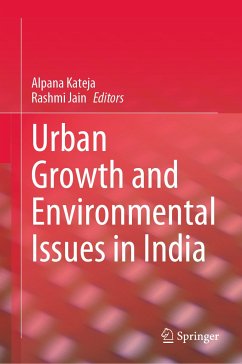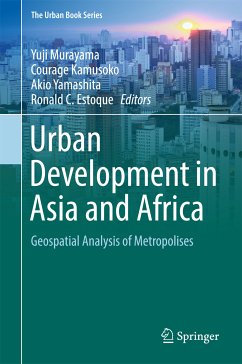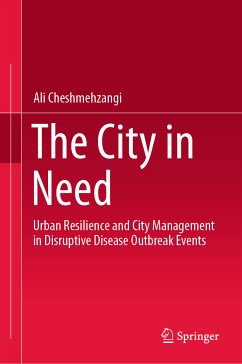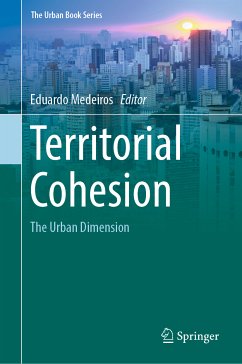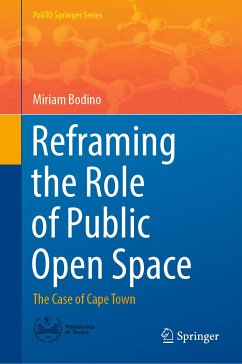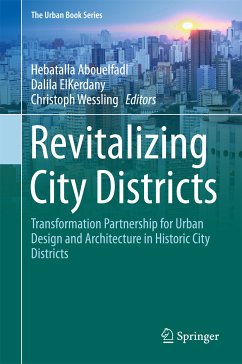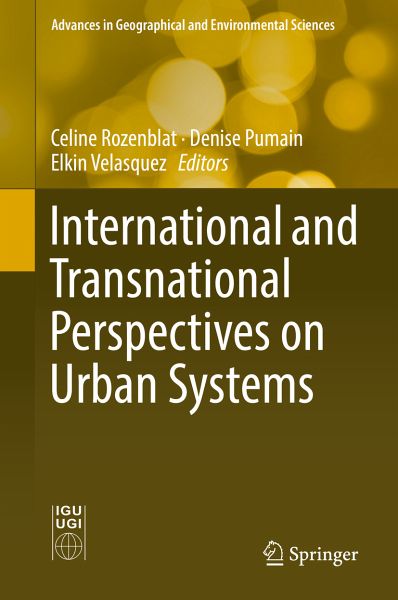
eBook, PDF
International and Transnational Perspectives on Urban Systems (eBook, PDF)

PAYBACK Punkte
60 °P sammeln!





Presents a new urban system theory
Is based on comparative empirical studies of urban systems linked to the urban system theory
Covers urban systems for diverse parts of the world
Shows cross-typologies of the world urban systems
Provides multi-scalar governance diagnostics and recommendations
Dieser Download kann aus rechtlichen Gründen nur mit Rechnungsadresse in A, B, BG, CY, CZ, D, DK, EW, E, FIN, F, GR, HR, H, IRL, I, LT, L, LR, M, NL, PL, P, R, S, SLO, SK ausgeliefert werden.
Céline Rozenblat is professor of urban geography at the University of Lausanne, Switzerland, and chair of the Urban Commission of the International Geographical Union (IGU). She develops studies of cities' systems on a world scale, multinational firms' networks, inter-urban dynamics, comparative urban data, mapping and visualization of networks in geography, and spatial analysis. Her research is mainly directed at the relations between local evolutions and networks dynamics into city systems. In a comparative perspective, she has built many databases on large European city samples and on world networks. In particular, since 1990 she had handled databases on localized multinational firms networks, on cities' properties, and their evolution at the European and global levels in a multi-dimensional and long-term approach. Diachronic and dynamic studies supply materials to develop spatial and dynamic models and visualizations. For several years she has dealt with the relation betweennetworks' developments and multi-level urban processes. She has participated in European projects such as ESPON FOCI 2008-2011, FP7 FET Insite (2011-2013) and Multiplex (2012-2016). She also participates in the EuropeAid project with China MEDIUM (2015-2019) on medium-size cities in China and recently has begun a new project, LOGIICCS (FNS 2015-2018), on the modelling of Indian and Chinese cities' integration into global networks of multinational firms and innovation. Denise Pumain is emeritus professor at the University Paris I Panthéon-Sorbonne, and director of Cybergeo, European Journal of Geography . She was chair of the Commission on Urban Development and Urban Life of the International Geographical Union (1992-2000) and director of the European Research Group "Spatial Simulations for Social Sciences" at CNRS. She specialized in urban modeling and theoretical geography. Her main scientific contribution regards building an evolutionary theory of urban systems and transferring concepts and models from self-organizing complex systems towards social sciences. She has received several academic awards (e.g., International Prize for Geography Vautrin Lud 2010; Corresponding member of the Austrian Academy of Science; Corresponding Fellow of the British Academy; an honorary doctorate in Lausanne and Liège Universities) and is holder of an ERC Advanced Grant (2010-2016). In her ERC-funded research she is looking at city system dynamics in the world by analyzing and modeling the geographical diversity of cities and systems of cities. Dr. Elkin Velásquez Monsalve is the director of the Regional Office for the Caribbean and Latin America (ROLAC), UN-Habitat, in Rio de Janeiro. He is co-leading a coalition of regional partners towards enabling the implementation of the New Urban Agenda in LAC, particularly promoting a new Ecosystem of Funds for Sustainable Urban Development. Before this appointment in 2013, he served as leader of the Regional and Metropolitan Planning Unit in the Urban Planning and Design Branch at UN-Habitat HQ in Nairobi. He is a native of Colombia. Having studied public administration at the ENA (French National School of Public Administration), he obtained his Ph.D. in geography, specializing in territorial policy and planning, at the University of Grenoble (France). He also did graduate work in engineering at the School of Mines, National University of Colombia in Medellín. Since 2009 he has led important global programs: He was UN-Habitat senior manager in the Nairobi HQ. In addition to work with the Regional and Metropolitan Planning Unit, he was chief of the Urban Governance Section from 2010 to 2011, and he was coordinator of the Safer Cities Program from 2009 to 2011. He also was responsible for the Gender Unit and established the flagship Initiative on National Urban Policies. His vast experience includes working in Argentina, Bolivia, Canada, Chile, Colombia, Ecuador, El Salvador, France, West Indies, Mexico, Nicaragua, Peru, and Venezuela. He also extensively backstopped and advised on projects in Africa and Asia on the New Urban Agenda, particularly on metropolitan planning and a new generation of national urban policies.
Produktdetails
- Verlag: Springer Nature Singapore
- Seitenzahl: 393
- Erscheinungstermin: 8. Mai 2018
- Englisch
- ISBN-13: 9789811077999
- Artikelnr.: 52565695
Für dieses Produkt wurde noch keine Bewertung abgegeben. Wir würden uns sehr freuen, wenn du die erste Bewertung schreibst!
Eine Bewertung schreiben
Eine Bewertung schreiben
Andere Kunden interessierten sich für
1) Gebundener Aktionspreis des Verlages. Die Ersparnis bezieht sich auf den gebundenen Preis, der außerhalb des Aktionszeitraums gilt.
| 2) Gebundener Einführungspreis des Verlages. Die Ersparnis bezieht sich auf den gebundenen Preis, der nach der Einführung gilt.
| 3) Gebundener Einführungspreis. Die Ersparnis bezieht sich auf den gebundenen Preis, der nach der Einführung gilt.
| 4) Die Ersparnis bezieht sich auf den gebundenen Preis, der außerhalb des Aktionszeitraums gilt.
| 5) Ersparnis im Vergleich zum gebundenen Preis für die Originalausgabe mit höherwertiger Ausstattung.
| 6) Ersparnis im Vergleich zum niedrigsten Preis der vergangenen 30 Tage.
| 7) Ersparnis im Vergleich zum Preis der gedruckten Ausgabe (broschiertes Buch).
| 8) Ersparnis im Vergleich zum Preis der gedruckten Ausgabe (broschiertes Schulbuch)
| 9) Ersparnis im Vergleich zum Preis der gedruckten Ausgabe (Buch mit Leinen-Einband)
| 10) Ersparnis im Vergleich zum Preis der gedruckten Ausgabe (gebundenes Buch)
| 11) Ersparnis im Vergleich zum Preis der gedruckten Ausgabe
| 12) Ersparnis im Vergleich zum vorherigen gebundenen Ladenpreis
| 13) Ersparnis im Vergleich zur Audio-CD-Ausgabe
| 14) Ersparnis im Vergleich zur CD-Ausgabe
| 15) Ersparnis im Vergleich zur deutschen Hardcover-Ausgabe
| 16) Ersparnis im Vergleich zur deutschen Taschenbuch-Ausgabe
| 17) Ersparnis im Vergleich zur früheren unverbindlichen Preisempfehlung (UVP) des Herstellers
| 18) Ersparnis im Vergleich zur Summe der vorherigen gebundenen Einzelpreise der im Sammelband/Schuber enthaltenen Bücher.
| 19) Ersparnis im Vergleich zur unverbindlichen Preisempfehlung (UVP) des Verlags der Originalausgabe
| 20) Ersparnis im Vergleich zur unverbindlichen Preisempfehlung (UVP) des Herstellers
| 21) Sonderausgabe. Ersparnis im Vergleich zum gebundenen Preis für die Originalausgabe mit zum Teil höherwertiger Ausstattung
| 22) Ersparnis im Vergleich zum früheren gebundenen Preis
| 23) Ersparnis im Vergleich zum niedrigsten Preis der vergangenen 30 Tage
| 24) Ersparnis im Vergleich zum niedrigsten Preis der vergangenen 30 Tage
| 25) Frühere unverbindliche Preisempfehlung des Herstellers
Alle Preise in Euro und inkl. der gesetzl. MwSt. | Innerhalb Deutschlands liefern wir preisgebundene Bücher versandkostenfrei. Weitere Informationen: bitte hier klicken
Bewertung schreiben
BEWERTUNGSFORMULAR
Schließen
Support
Bitte wähle dein Anliegen aus:
Rechnungen
Bestellstatus
Retourenschein
Storno
Sollte dein Anliegen nicht dabei sein, findest du weitere Auskünfte zu deinen Fragen auf unseren Serviceseiten.
Schließen


